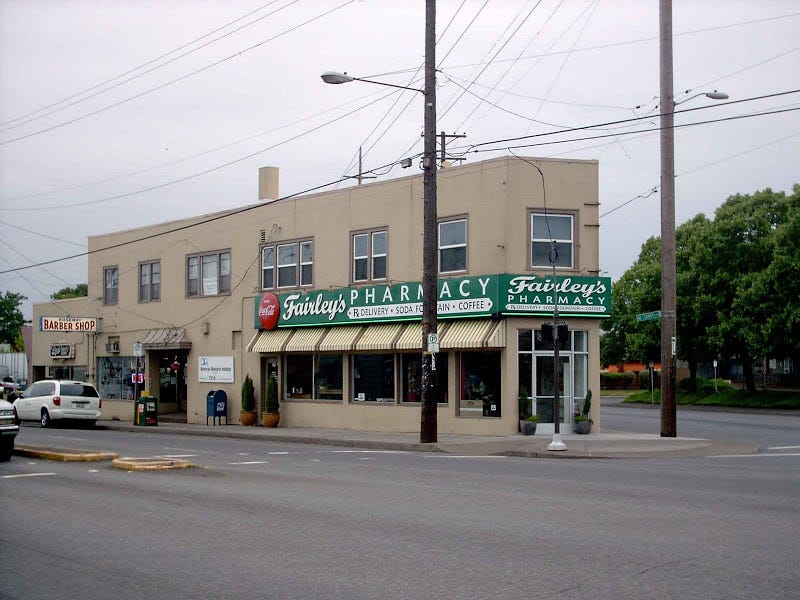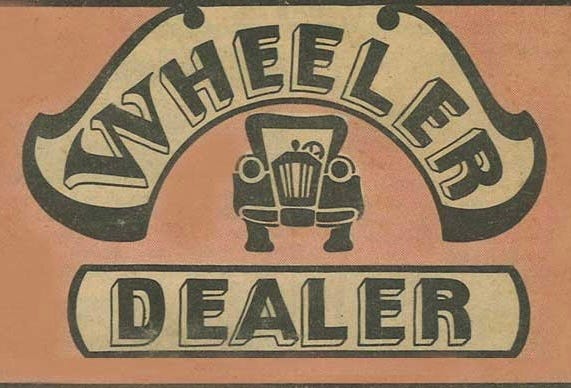The Wheeler Dealer office was on the second floor of an odd triangular building at Southeast 72nd and Sandy, above Fairley’s Pharmacy. It was, of course, just a front for the real business at hand – not that anyone was particularly fooled.
In fact, the cops were onto them from the get-go. Shortly after Roger arrived in Portland he was talking to the owner of the Roseway movie theater, which was just across Sandy Boulevard. The manager said some DEA agents had stopped by asking if they could do a stakeout in his theater, and when he told them hell no they’d gone to the bar next door. So presumably there were surveillance cameras in the second floor of the bar.
To tell the truth, the Wheeler Dealer probably never made more than a few hundred bucks a month at best. So it obviously wasn’t the sort of business front intended to hide drug profits. But you’ve got to have something to say if the cops jam you up and ask what you do for a living, and being a journalist is probably as good as anything else.
Yes, I know, the Wheeler Dealer was only an auto trader. But as Roger would tell his staff, which on layout days numbered five or six women who typed all the adds, printed out camera-ready copy, collected the photos, then hand-rolled it all down with wax before taking it off to the printers – the guiding principles of journalism – accuracy, honesty and fairness – still applied. As they certainly do here, I should probably add.
If it’s a ’74 Mercury with transmission problem, you can’t get away with saying it’s in mint condition. You have to make sure the right car pictures match up with the right descriptions. And for goodness sakes, get the seller’s phone number correct or you have to give them their money back.
The Wheeler Dealer also got into the commercial printing end of it with business cards and menus for neighborhood restaurants. And it wasn’t too long at all before they branched out into what those in the profession often refer to as public service journalism – in this case, the issue being whether non-church related organizations could hold bingo games.
As it happened, Amato’s Lanes had recently gone out of business and the building’s new tenant, which was something out of Nevada called the Church of Conceptual Truth, was running a bingo parlor there.
In fact, as revealed a couple of years later in a multi-part series by the Oregonian’s crackerjack investigative reporters, Les Zaitz and Jim Long, the two ministers running the games were just a couple of old Las Vegas dealers, and – Heavens to Betsy – the Church of Conceptual Truth was not even a church at all.
But for a time there, the Wheeler Dealer did what it could to promote the church’s constitutional bingo rights, and of course collect as much advertising revenue from the gambling interests as they could.
In most other ways, though, it should probably be noted that the Wheeler Dealer was not your typical journalistic venture. When a rival auto trader from Seattle attempted to move into the Portland market, Roger put them out of business by sending over a crew one night to break into their office and cart everything away. Which was, of course, the same thing he used to do back when he was running the meth business in Portland.
Meanwhile, more bank robber types were drifting into town. Roger and Steven drove down together to pick up Donnie Booth, an armed robber who was being discharged from OSP. Among the crew, it was a joke that Booth, who at 5-5 or so looked like a tough little sprite anyway, could never stay out of prison for more than a few months before being arrested again.
“Yeah,” he’d shoot back at them, “but I got away with the Big One, didn’t I?” – meaning of course the DB Cooper skyjacking which was still very much on everyone’s minds. Everyone always got a good laugh out of that one.
And then there was Inez Guerro, the escape artist who back in OSP had briefly entertained with Roger the idea of smuggling a gun in through the vegetable room. He’d escaped again, this time from McNeil Island, the federal prison in the middle of the Puget Sound – by stitching together some prison issue raincoats into a raft and just paddling way. And let us not forget two very heavy dudes from back east, Lawrence Burhoe and Fat Pat O’Shea, who Steven had met in Marion.

Besides everything else, it seems, the Wheeler Dealer office was a sort of social hub. And every now and then, when the bank robbers dropped by, Roger would see them look longing out the window at the U.S. National Bank Building. There was a clear view of it just across the street to the south. In fact, you were looking down directly into their parking lot.
“Hey,” Roger would tell them, trying to make it sound like a joke, “don’t rob that bank. That’s where I keep my money.” But they knew he meant it too.
Then one morning when he came into work he looked at the work schedule and realized that someone – and probably him, because there was no one else to send – had to drive out to an address in Battle Ground, Washington, about 25 miles across the river from Portland, to take a photo of a car someone wanted to sell. It was going to take a couple of hours but it had to be done.
So he got in his car and drove to Battle Ground. And after about an hour or so of driving around he stopped at a pay phone – there weren’t cell phones yet – and called the office to see if there was anything else to go on because this address just didn’t seem too exist.
But before he could get a word out, the office manager Barbara Sargeant – the same one, if you remember, who along with her husband Ron, switched coats with Roger and Sandra so they could escape to Arizona – blurted out:
“Roger, you’ll never guess what I just saw. Richard Nixon and John Kennedy and I don’t know who else just robbed the U.S. National Bank and there’s smoke everywhere!”
As Roger immediately realized, he’d been sent on a wild goose chase so he’d be gone when they robbed the bank. He piled into his car and headed back to Portland as fast as he could.
As trial testimony would later establish, Inez Guerro, Donnie Booth and Fat Pat O’Shea, wearing rubber Halloween masks – according to one witness, Laurel and Hardy as well as Tricky Dick Nixon – had indeed just knocked off Roger’s favorite bank, brandishing a 50-caliber machine gun and setting off smoke bombs as they made their exit.
On the drive back to Portland, Roger paged Stephen to meet him on the second-story Fred Meyer parking lot which overlooked the Bargain Store, where Stephen would be hanging out that morning. When he arrived, Steven was looking out over the waist-high wall at what, as he explained to Roger, was a locksmith trying to open the Bargain Center door to release several FBI agents who were trapped inside.
Just minutes after the robbery, a Portland police officer, recognizing Donnie Booth from the description on the police radio – 5-5 to 5-6 with curling collar-length hair, wearing an Hawaiian shirt and checked pants – had arrested him walking along a sidewalk four blocks from the bank.
And putting two and two together – because they knew that Booth was a member in good standing of Kessler’s bank robbery crew – several FBI agents had immediately swooped down on the Bargain Center.
It was a royal screw-up from the beginning. When the bank robbers were supposed to be changing cars, from the initial getaway car to the backup, Booth recognized the back-up driver as someone he’d beaten just the other day in a drug deal. And since Booth and the other robbers had just left all their weapons in car number one, he bailed out thinking the driver of the second car just might decide to shoot him. Anyway, that explains why Booth was walking down the sidewalk.
Kessler, who seemed to be enjoying things too much, told Roger that when the FBI agents burst in he asked them if they had a warrant. When they said no, he walked out, shutting the door behind him and locking them inside.
“Stephen,” Roger said, “it’s not funny. No way we can take this kind of heat. If I were you, I’d pack up everything and get out of town.”
If he could, Roger said, that’s what he’d do. Throw everything in the back of his car and take off. But Sandra was pregnant, he couldn’t leave now.
Kessler probably didn’t even hear him. He couldn’t stop grinning at the FBI agents still locked up down there in the Bargain Center.





At least with the current editor still in charge, the Oregonian will never acknowledge how badly they have disgraced themselves over the Francke case.
"crackerjack investigative reporters, Les Zaitz and Jim Long," Riiiiiggghhhttt. Repeaters. FTFY